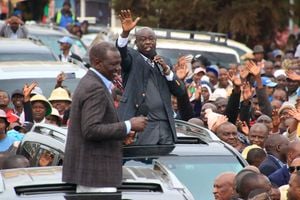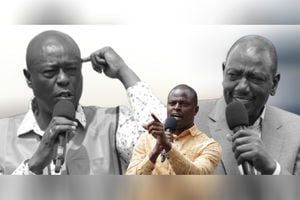Of literature, greatness, and Raila’s quest for top AU job

Azimio la Umoja leader Raila Odinga speaks to the media in Nairobi on February 15, 2024 when he formally declared his interest in the African Union Commission chairmanship.
“Men are haunted by the vastness of eternity. And so we ask ourselves, will our actions echo across the centuries? Will strangers hear our names long after we’re gone, and wonder who we were, how bravely we fought, how fiercely we loved?" so said the character Odysseus in the 2004 movie entitled Troy.
Odysseus, in his quest in Troy, had stepped over a threshold into some vast unknown. Maybe he could hear the music of the spheres — the place where destiny meets personal ambition for greatness. Or maybe he felt like he was on the cusp of something much scarier — “haunted by the vastness of eternity”.
It reminds one of the words of Yuan Zhen, the Chinese novelist, poet, and politician who famously said that, “For one who has seen the vast ocean, all else can hardly be considered water”.
For Odysseus, an ambitious man who had seen a “vast ocean”, nothing else would do but legacy-inspiring greatness. He wondered if his actions would echo across the centuries.
Odysseus is aptly typified by former Prime Raila Odinga in his quests for fighting fiercely for what he believes in. This was especially demonstrated on February 15 when former Nigerian president Olusegun Obasanjo backed Mr Odinga as a feasible candidate for the African Union Commission’s top job.
Having contested the Kenyan presidency many times and lost (he and his supporters claim sometimes he did lose under controversial circumstances), Mr Odinga is fearsome, iconic, defiant and charismatic though somehow doomed in his presidential quest so far.
He is a man of sprawling dreams and outsize ambition; out to smelt, forge and fabricate himself into a man greater than the Prime Minister he once was but is like an emperor of uncertain conquest with a shaky kingdom.
He has fallen short in the past but not for lack of trying. He seems to have given his all to the pursuit of becoming president. As a presidential contender, he has campaigned with a kind of wistful nostalgia that borders on dreaminess — in warm fuzzy overtones. He has the bearing of a statesman with an elder’s grace — confident and abrasive both — and gravitas, greater than that of most politicians.
He has that poignant, steady, serious and watchful gaze of a man who signifies political style and glamour and hullabaloo. And glitz galore. He knows how to glide along the red carpet surrounded by men in dark Giorgio Armani or Louis Vuitton suits — menace in their faces. He knows the adrenaline of crowds, the swell and press of people; the soaring elation, the great billowing expanses of prospective voters who turn to listen to him in his rallies.
But after every election in the last several electoral cycles, he has been like a tragic literary character with so much sadness that it’s heartbreaking. There is usually the post-election press conference after his loss, the fading strength of his voice, the room filled with sunlight, as if it were a sanctuary where every feeling might be aired and resolved.
Most of his supporters probably remember the feeling of helplessness, the sunlight, and him wiping his eyes with a handkerchief (a gesture, it is said, necessitated by the years he spent in prison that affected his eyes but that sometimes comes across like being overcome by emotion).
While all that time, far, far from the flashing press conference cameras, far from the braying Kenyan capital of Nairobi, in some of the most remote corners of the country, amidst quiet, level fields where sandy paths disappear into the depths of the savannah or in the soft rolling hills, the incredibly sprawling plains or the jagged and rugged peaks, his supporters are always left stunned after every loss. However, like one at ease amid the ruins, Mr Odinga has never been deterred in crisis after crisis, never one to shy away from pressure.
Affectionately called “The Enigma” by his supporters, he seemingly embodies the inexhaustible mystery of greatness and the powerlessness against the strong currents of fate and history. Like many people in history and literature, he has seen fate deal him a knockout blow; reducing his facade of bravado and puff to a mound of ashes.
And like many literary characters especially Shakespearean, he is a man who has grappled with the big questions of life: especially on winning and losing. He must know what it means to be at the top, dining and wining with presidents. Or maybe he knows that life is just sometimes painful and sad — learning that after every major loss, there is really nowhere to turn, and that life is far, far lonelier.
He has had something akin to an incomplete life with a comma, if not a parenthesis and, like a half-finished sentence without a full stop. The quest for the presidency has always left his life hanging midair — we hope that the AU job completes the sentence of Mr Odinga’s life. We wish him success as he carries the Kenyan flag in the fight for the AU commission’s top job. As Ama Ata Aidoo wrote in Our Sister Killjoy, “Besides, when hope dies, what else lives?”. We hope for the best.
- The writer is a book publisher based in Nairobi. [email protected]





